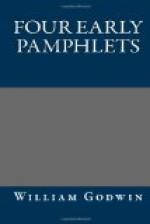I would not have a child required to commit any thing to memory more than is absolutely necessary. If, however, he be a youth of spirit, he will probably learn some things in this manner, and the sooner because it is not expected of him. It will be of use for him to repeat these with a grave and distinct voice, accommodated to those cadences, which the commas, the periods, and the notes of interrogation, marked in his author, may require, but without the smallest instruction to humour the gay, or to sadden the plaintive.
Another article, that makes a conspicuous figure in the education of our youth, is composition. Before they are acquainted with the true difference between verse and prose, before they are prepared to decide upon the poetical merit of Lily and Virgil, they are called upon to write Latin verse themselves. In the same manner some of their first prose compositions are in a dead language. An uniform, petty, ridiculous scheme is laid down, and within that scheme all their thoughts are to be circumscribed.
Composition is certainly a desirable art, and I think can scarcely be entered upon too soon. It should be one end after which I would endeavour, and the mode of effecting it will be farther illustrated in the sequel, to solicit a pupil to familiarity, and to induce him to disclose his thoughts upon such subjects as were competent to his capacity, in an honest and simple manner. After having thus warmed him by degrees, it might be proper to direct him to write down his thoughts, without any prescribed method, in the natural and spontaneous manner, in which they flowed from his mind. Thus the talk of throwing his reflections upon paper would be facilitated to him, and his style gradually formed, without teaching him any kind of restraint and affectation. To the reader who enters at all into my ideas upon the subject, it were needless to subjoin, that I should never think of putting a youth upon the composition of verse.
From all I have said it will be sufficiently evident, that it would be a constant object with me to model my instructions to the capacity of my pupil. They are books, that beyond all things teach us to talk without thinking, and use words without meaning. To this evil there can be no complete remedy. But shall we abolish literature, because it is not unaccompanied with inconveniencies? Shall we return to a state of savage ignorance, because all the advantages of civilization have their attendant disadvantages?
The only remedy that can be applied, is to accustom ourselves to clear and accurate investigation. To prefer, whereever we can have recourse to it, the book of nature to any human composition. To begin with the latter as late as may be consistent with the most important purposes of education. And when we do begin, so to arrange our studies, as that we may commence with the simplest and easiest sciences, and proportion our progress to the understanding of the pupil.




